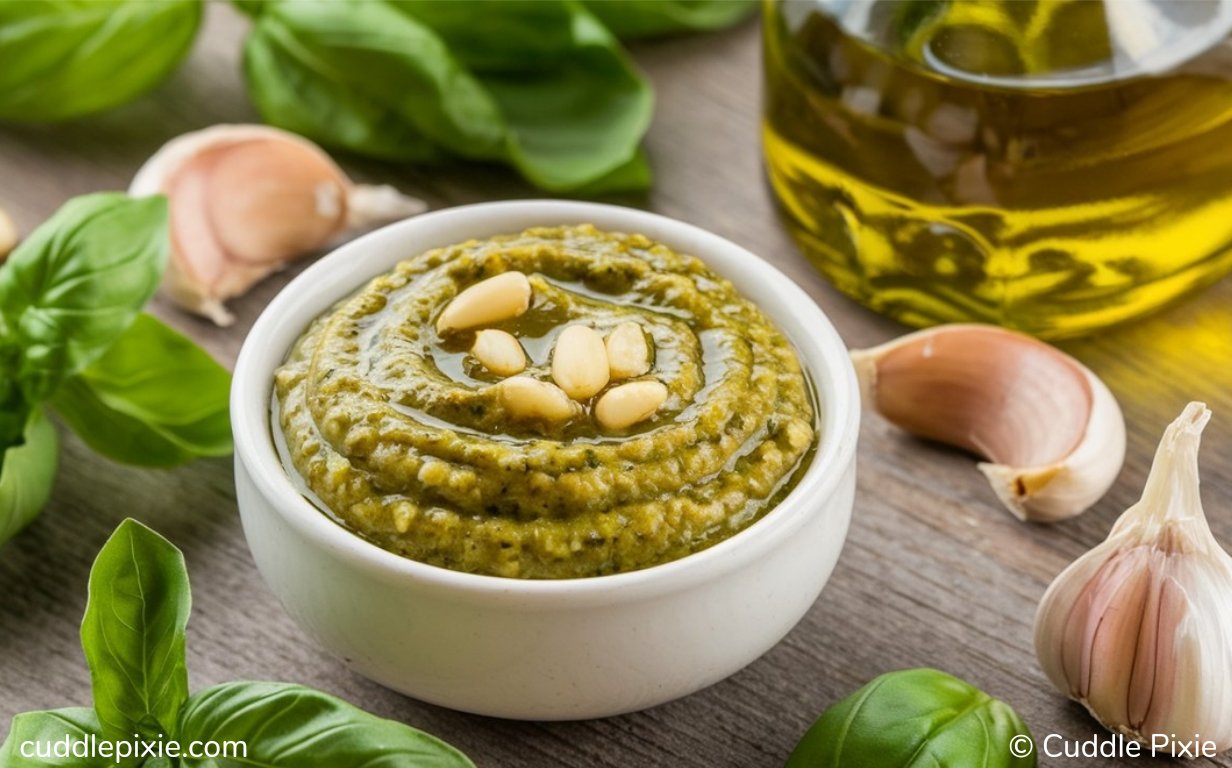Pregnancy brings with it many questions about what’s safe to eat, and pesto—a fragrant, flavor-packed sauce made with basil, garlic, pine nuts, olive oil, and Parmesan—is often on the list of debated foods. While it’s widely loved, many expecting mothers wonder whether pesto is a safe and healthy option during pregnancy. In this detailed guide, we’ll explore the nutritional benefits of pesto, its safety during pregnancy, and how it can be incorporated into a pregnancy diet.
In This Article
What is Pesto?
Pesto, traditionally known as “Pesto alla Genovese,” originated in Italy and has become a staple in kitchens worldwide. The traditional version includes basil, garlic, pine nuts, Parmesan cheese, and olive oil, but there are many variations today, including vegan options and recipes using different herbs or nuts. Its vibrant green color, rich aroma, and savory taste make it a popular choice for pasta, sandwiches, salads, and more.
Is Pesto Safe During Pregnancy?
The answer is generally yes, but with some important precautions. As Dr. Michael Lahey, a maternal health physician, points out, the common ingredients in pesto are safe for pregnant women if proper care is taken to avoid food-borne illnesses like listeriosis.
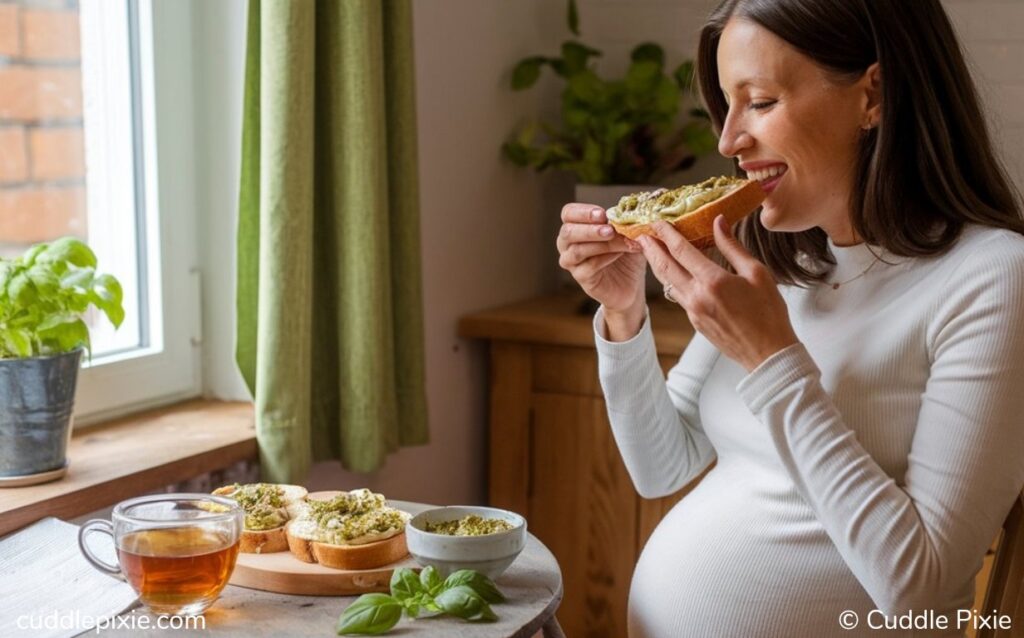
Key safety points include:
- Pasteurized Cheese: Traditional pesto often uses Parmesan cheese, which may sometimes be unpasteurized. Pregnant women should ensure that the pesto they consume is made with pasteurized Parmesan to avoid the risk of listeria.
- Proper Storage: As Dr. PK Tan, a gynecologist, advises, pesto should be fresh and properly stored. Ingredients like garlic and olive oil can spoil if not handled correctly, which increases the risk of bacterial contamination.
- Homemade Pesto Precautions: If you’re making pesto at home, be sure to thoroughly wash the basil leaves to remove dirt or pesticides and use pasteurized cheese. Additionally, avoid raw eggs or dairy products that may be included in some variations of pesto.
Nutritional Benefits of Pesto for Pregnant Women
Pesto is not just a flavor enhancer but also packs a significant nutritional punch. Here’s a breakdown of the benefits of each key ingredient:
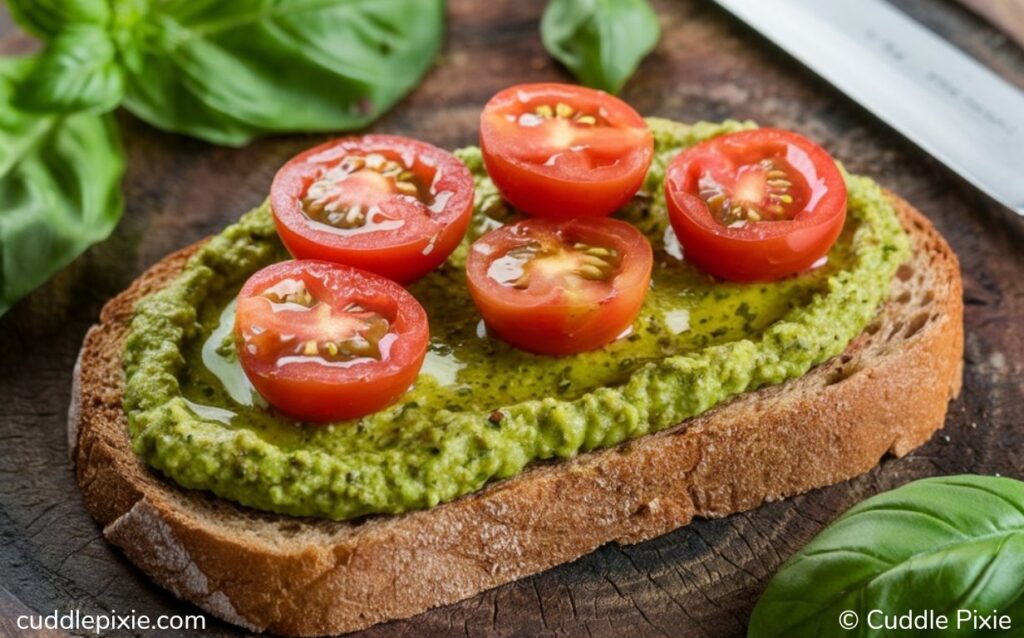
Basil
- Vitamins A, C, and K: These vitamins are essential for supporting immunity and overall health during pregnancy. According to Monelle Burrus, a nurse specializing in maternal health, vitamin K is particularly important for blood clotting and bone health, both of which are crucial during pregnancy.
- Antioxidants: Basil contains powerful antioxidants that help combat oxidative stress, which can be heightened during pregnancy due to hormonal changes. Dr. Michael Lahey notes that these antioxidants may help protect both mother and baby.
Garlic
- Immune Support: Garlic is renowned for its antibacterial and anti-inflammatory properties. During pregnancy, garlic can help boost the immune system and protect against infections, as highlighted by Dr. Lahey.
- Nausea Relief: Some pregnant women experience relief from mild nausea after consuming garlic, though its strong taste can be overpowering for others.
Pine Nuts
- Rich in Magnesium and Iron: Pine nuts are a good source of these essential minerals. Magnesium supports fetal growth, and iron helps prevent anemia—a common issue during pregnancy.
- Healthy Fats: The unsaturated fats in pine nuts promote maternal health and are crucial for fetal brain development.
Olive Oil
- Monounsaturated Fats: These fats are heart-healthy and important for the baby’s brain development. Olive oil also contains antioxidants that reduce inflammation and support skin health.
- Digestive Aid: Olive oil is gentle on the digestive system and can help alleviate pregnancy-related constipation, a common complaint in the second and third trimesters.
Parmesan Cheese (Pasteurized)
- Calcium: Parmesan is a great source of calcium, which is vital for the development of the baby’s bones and teeth. Adequate calcium intake also supports the mother’s bone health, preventing loss of bone density during pregnancy.
- Protein: Parmesan is rich in protein, supporting the development of fetal tissues and organs.
- Safe Only if Pasteurized: It’s crucial to use pasteurized Parmesan to avoid the risk of listeria, a foodborne illness that can be harmful during pregnancy. Many store-bought pestos may contain unpasteurized cheese, so always check the label or make pesto at home with pasteurized ingredients.
Potential Risks of Eating Pesto During Pregnancy
While pesto is generally safe, it’s important to be aware of potential risks and take precautions.
1. Listeria Contamination
As previously mentioned, pesto made with unpasteurized cheese can pose a risk of listeria, which can be harmful to both the mother and the baby. Always check product labels or use pasteurized alternatives.
2. High Sodium Levels
Store-bought pesto can sometimes contain high levels of sodium. While sodium is necessary during pregnancy, excessive intake can contribute to high blood pressure and increase the risk of complications like preeclampsia. Dr. Tan recommends consuming pesto in moderation, especially when using pre-packaged versions.
3. Digestive Sensitivities
Some women may experience heartburn or indigestion from the garlic in pesto, particularly if consumed in large amounts. If you find that garlic exacerbates these symptoms, you might want to reduce the quantity or opt for a pesto variation that’s lighter on garlic.
Homemade vs. Store-Bought Pesto: What’s Better for Pregnancy?
When considering whether to opt for homemade or store-bought pesto during pregnancy, both options have their pros and cons. It’s important to weigh them carefully to make the best choice for your health and safety.
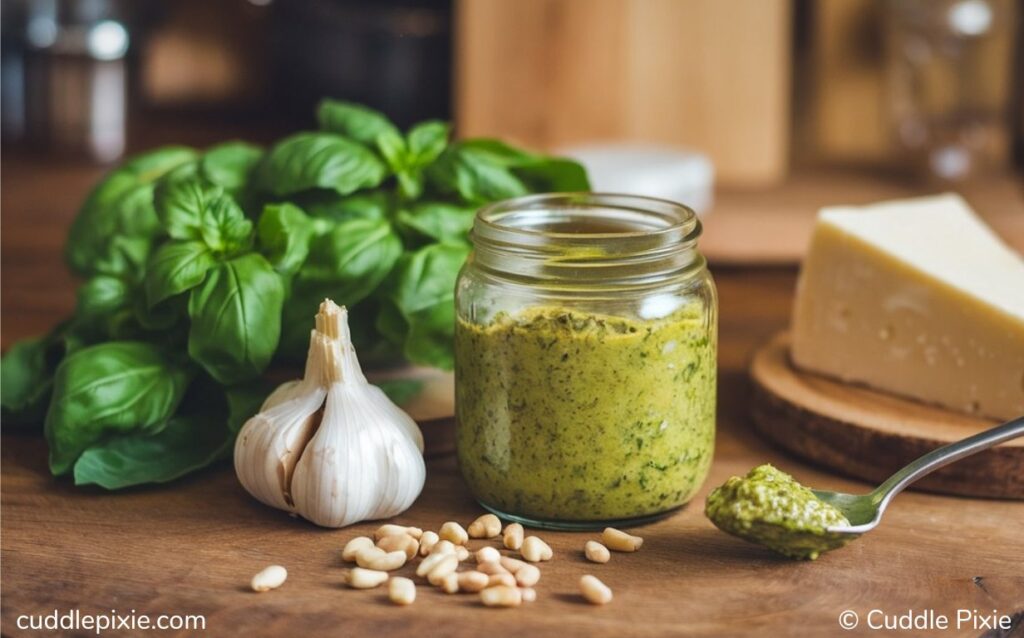
Store-Bought Pesto:
Pros:
- Convenience: Pre-made pesto saves time and is readily available at grocery stores.
- Variety: There are many different flavors and brands, catering to various tastes and dietary preferences, including vegan and nut-free options.
Cons:
- Preservatives & Additives: Many store-bought pestos contain preservatives, which can be high in sodium, potentially contributing to issues like high blood pressure during pregnancy.
- Unpasteurized Cheese: Traditional store-bought pestos may use unpasteurized Parmesan cheese, which poses a risk for listeria, a harmful bacteria that pregnant women are more susceptible to.
- Freshness: Pesto made commercially may not have the same freshness as homemade versions, which can impact both flavor and nutrient quality.
Homemade Pesto:
Pros:
- Control Over Ingredients: You can ensure that every ingredient is safe, fresh, and pregnancy-friendly. You can use pasteurized cheese, or skip the cheese altogether for a vegan or dairy-free version.
- No Preservatives: Homemade pesto is free from additives and preservatives, making it a healthier option, especially if you’re watching your sodium intake.
- Flavor Customization: You can tweak the recipe to suit your personal tastes, whether that means adding more garlic for its antibacterial benefits or opting for alternative nuts like walnuts or almonds.
Cons:
- Time-Consuming: Making pesto from scratch requires preparation, which can be a challenge if you’re juggling the many demands of pregnancy.
- Storage Issues: Homemade pesto doesn’t last as long as store-bought versions due to the lack of preservatives. You’ll need to store it properly in the fridge and consume it within a few days, or freeze it for later use.
Expert Recommendation:
Dr. PK Tan, a senior consultant obstetrician, suggests that homemade pesto is generally a safer option for pregnant women because it allows you to control the quality and safety of the ingredients. He advises using fresh, high-quality basil, pasteurized cheese, and properly storing any leftovers to avoid contamination. Homemade pesto ensures you’re not consuming excess sodium or preservatives, making it a healthier choice for both mother and baby.
Can Pesto Address Pregnancy-Related Issues?
Pesto can help alleviate some common pregnancy symptoms thanks to its key ingredients:
- Nausea: Garlic and basil, two primary ingredients, have mild anti-nausea effects, which can help reduce the queasiness many women experience during the first trimester.
- Constipation: Olive oil acts as a gentle digestive aid, helping to alleviate constipation that often occurs during pregnancy.
- Fatigue and Muscle Cramps: The magnesium and iron in pine nuts help combat fatigue and reduce muscle cramps, both of which are common symptoms during pregnancy.
Incorporating Pesto into a Pregnancy Diet
Pesto is incredibly versatile and can be incorporated into a variety of pregnancy-friendly meals. Here are some suggestions:
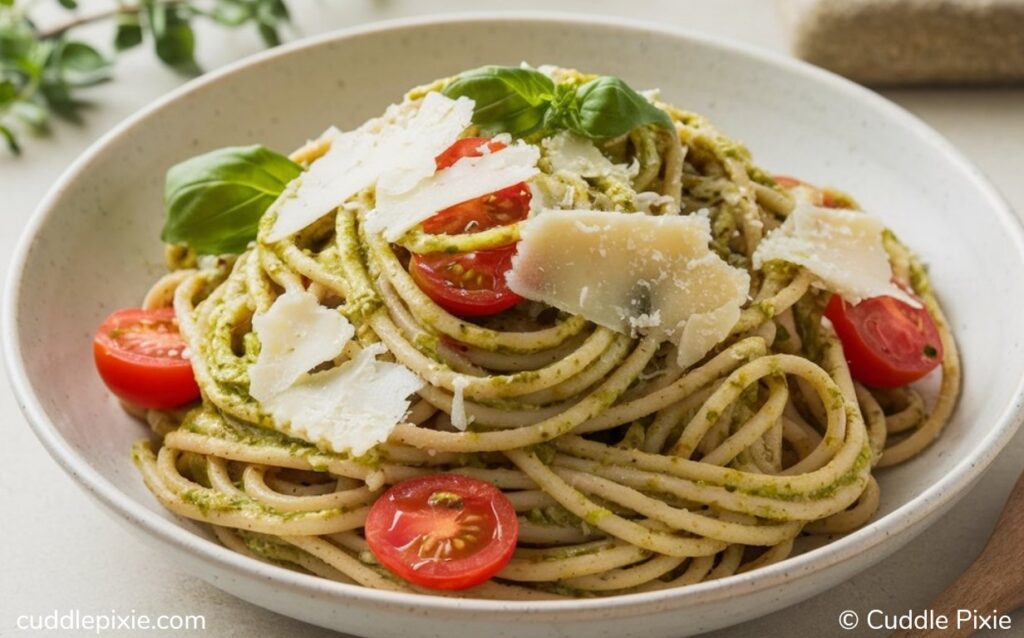
Whole Wheat Pasta with Pesto
Swap traditional pasta for whole wheat to add more fiber to your diet, which can help with digestion and prevent constipation. Add vegetables like spinach or cherry tomatoes for an extra nutrient boost.
Pesto on Avocado Toast
For a healthy and satisfying breakfast, spread pesto on avocado toast. This combination provides a mix of healthy fats, fiber, and protein, all essential for both mother and baby.
Pesto as a Salad Dressing
Dilute pesto with lemon juice and olive oil to create a refreshing and healthy salad dressing. This is a great way to add flavor to your greens without adding too much sodium or fat.
Pesto and Chicken Sandwich
For a hearty lunch, spread pesto on whole grain bread and add grilled chicken, a good source of lean protein. This makes for a delicious and filling meal that provides energy and important nutrients.
Final Thoughts
Pesto, with its blend of nutrient-rich ingredients, can be a safe and delicious addition to your pregnancy diet. As long as you take care to avoid unpasteurized cheese and ensure proper food safety measures, pesto offers a wealth of nutritional benefits that support both maternal and fetal health. Whether you’re adding it to pasta, spreading it on sandwiches, or mixing it into salads, pesto provides a versatile way to enhance your meals and boost your well-being during pregnancy.
Remember, moderation is key, and it’s always best to consult with your healthcare provider before making significant changes to your diet during pregnancy. Enjoy the flavors and health benefits that pesto has to offer!
Frequently Asked Questions
Is it safe to eat pesto every day during pregnancy?
While pesto is generally safe to eat during pregnancy, it’s important to consume it in moderation. Store-bought pesto may contain high levels of sodium, which can contribute to high blood pressure if eaten in excess. Additionally, ensure that any cheese in the pesto is pasteurized to avoid the risk of listeria. If you enjoy pesto regularly, consider making it at home to better control the ingredients and nutritional content.
Can I eat pesto if I have morning sickness?
Yes, pesto can be eaten if you have morning sickness, but it depends on how your body reacts to strong flavors. Garlic, a key ingredient in pesto, may help alleviate mild nausea in some women. However, some pregnant women find the smell and taste of garlic to be overpowering. If garlic aggravates your nausea, you might want to reduce the amount in your recipe or opt for a milder variation of pesto that uses less garlic or substitutes it with another ingredient like parsley.
What kind of pesto should I avoid during pregnancy?
Avoid any pesto that contains unpasteurized cheese, as it can increase the risk of listeriosis, a harmful infection for pregnant women. Additionally, be cautious of pesto with raw eggs, which are sometimes used in certain variations of the sauce. Store-bought pesto can also contain preservatives and excessive salt, so homemade pesto using fresh, pregnancy-safe ingredients is a better option.
Is pesto halal?
Pesto can be halal, but it depends on the ingredients used and how it’s prepared. Traditional pesto includes ingredients like basil, garlic, olive oil, pine nuts, and Parmesan cheese. The main concern for halal compliance is the Parmesan cheese.
Parmesan cheese, along with other cheeses, may use animal rennet during production, which is derived from the stomach lining of animals. If the rennet comes from animals that were not slaughtered according to Islamic guidelines, the cheese is not considered halal. However, some Parmesan and other cheeses are made using microbial or vegetarian rennet, which would make them halal.
Is pesto gluten-free?
Yes, traditional pesto is gluten-free. The main ingredients—basil, garlic, pine nuts, olive oil, and Parmesan cheese—do not contain gluten. However, it’s essential to check store-bought or pre-packaged pesto, as some brands may add ingredients like preservatives or fillers that could contain gluten.
If you have a gluten sensitivity or celiac disease, be sure to read labels carefully or make homemade pesto to ensure it’s entirely gluten-free. Additionally, pesto is often served with pasta, so opt for gluten-free pasta to keep the entire dish gluten-free.
